“The desire of the righteous ends only in good, the expectation of the wicked (ends) in wrath. One gives freely, yet grows all the richer; another withholds what he should give, and only suffers want.” (Proverbs 11:23-24)
The best way to keep a prisoner from escaping is to make sure he never knows he’s in prison. -- Fyodor Dostoyevsky
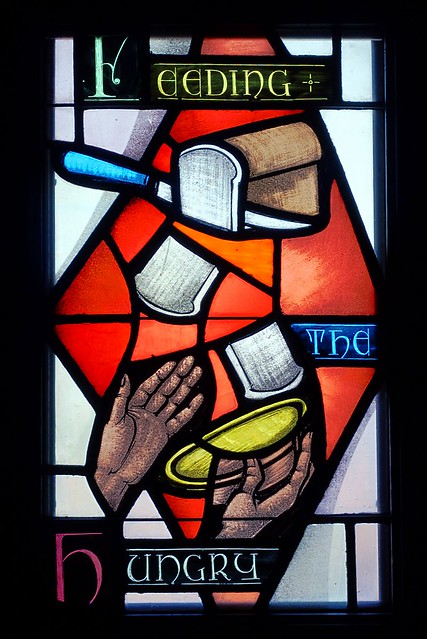 |
| God commands individuals to be charitable, not governments. |
Socialists in the United States (and other Western countries) have been pushing their wicked agenda in schools, TV, movies, newspapers, magazines, and the news media for many decades, but there hasn’t been much serious public discussion about the implications of the socialist worldview and political agenda. Ever since the unexpected success of socialist Democrat Senator Bernie Sanders in the 2016 United States presidential campaign there has been much more public interest in the U.S. in the ideas of socialism. If you recall, Senator Sanders might have won the Democratic nomination for president if it hadn’t been for the Clinton controlled “Democratic” Party rigging the primaries to help Hillary Clinton win the nomination. Since then, in 2018, an openly socialist, naïve young woman from New York was elected to the United States Congress.
Socialism has never been very popular in the United States because we have a history of both Christianity and good education where people are smart enough (and free enough) to learn the weaknesses of socialism, and reject it. Both of those things are changing due to many decades of socialist indoctrination of students by unionized teachers in schools and universities. The result of this is that socialism seems to be gaining in popularity in our country.
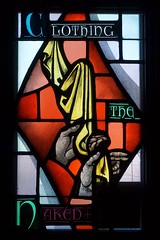 |
| Christians ought to be charitable as Christ is charitable to us. |
 |
| Adam and Eve stole what was forbidden and condemned us all to die. Jesus gave up everything He had and redeemed us from death. |
The premise of socialism is that it purports to desire to make everyone equal. In practice it accomplishes this by making everyone impoverished, except for the ruling tyrants. There are always ruling tyrants in societies which practice socialism, because the system can’t work without a totalitarian government enforcing this unnatural social structure. There is little or no concept of personal property in socialism, but all things are shared among everyone. I remember a few years after the disintegration of the Soviet Union I spoke with a young man who was from the former Soviet Union (from one of the Baltic nations, as I recall), and he said that during the Soviet days there was no concept or teaching of the Seventh Commandment (“You shall not steal.”) as a command from God. It was a revelation for them to learn this concept once they were free from socialism. The Seventh Commandment assumes that there is such a thing as personal property, and that it transgresses God’s will to obtain someone else’s property in a dishonest way, or, as Martin Luther explained in the Small Catechism, in a way which only seems right – like a governmental Robin Hood-like redistribution of wealth. In this way socialism is fundamentally opposed to Christianity, and God’s created order.
| The Good Samaritan used his own money to help the man injured by robbers. |
Here one might object and say that in the Acts of the Apostles the church of the Apostles lived in what seems like a socialist community. “All the believers were together and had everything in common. Selling their possessions and goods, they gave to anyone as he had need.” (Acts 2:44-45) This is true enough, but it is not a small thing to note that they did this voluntarily, and their actions were not coerced by the Apostles or the governing authorities. When Ananias and his wife Sapphira were killed by God (Acts 5), it wasn’t because they withheld their property from the community. They were free to sell their property and do with the proceeds as they saw fit, even keeping all, or part of, the proceeds for themselves. Their crime was that they made a show of selling their property and saying that they had given ALL the proceeds to the church, while they actually kept some of the money for themselves. They died because they were liars, and they pretended to be holy to make people think they were better than they actually were. God showed everyone what they really were like (i.e. dead).
| The Magi gave valuable gifts to Jesus. This helped the holy family in Egypt, and also foreshadowed Christ’s suffering and death. |
Wherever socialism enforces equal outcome, rather than equal opportunity, there is no incentive for people to work hard or be innovative or entrepreneurial. If I am going to be paid the same as my neighbor no matter how hard I work, then why should I work harder than my lazy or incompetent neighbor? This shows the unfairness of a system which pretends to be equal for all people. If you have educated workers who can think logically and reason deductively and have a free choice, then they would never choose socialism over a free market.
Socialism dehumanizes people. No matter how talented you are, no matter how hard you work, no matter how good a job you do, under socialism you are no more valued than the least talented, laziest, incompetent hack. You can never get ahead because it is unnaturally forbidden by law, or social norms, or whatever is enforcing the socialist ideal. In this way capitalism is better because it rewards people for a job well done, or for doing a task that is greatly needed, but is not able to be accomplished by many people. In a Capitalist society there is real incentive to do the best that you can do with your talents and effort. This values people much more than a system which says that no matter how much you can do, or if you can do something that no one else can do, you are not worth any more than anyone else.
Christianity says that you are precious to God. Even though you are a sinner and deserve only God’s wrath and punishment, God loves you and has redeemed you from your sin through the life and death of Jesus Christ. It doesn’t matter if you are a newly conceived one-celled person, or if you are a life-saving doctor, or if you are a brain injured quadriplegic, you are precious to God. God proves His love by becoming the man, Jesus Christ and living a full life from conception to death to resurrection in order to rescue you from the consequences of your sin. Although some may say that this sounds like a socialist ideal, the Bible is clear that God gives different gifts to different people in life. Some are more able to contribute to society than others. What makes Christianity different from socialism is that since you are precious to God then Christians ought to consider others precious also, and as much as we can have a say, should promote a society that treats its citizens the same way. Socialism is not the way to treat humans in a loving way.
 |
| For you know the grace of our Lord Jesus Christ, that though he was rich, yet for your sake he became poor, so that you by his poverty might become rich. - 2 Corinthians 8:9 |
Those who favor socialism are either the uneducated who are manipulated into thinking that this is a good deal, or the elites who seek to take advantage of the ignorant workers. The elite socialist politicians want to be seen as helping people, but they don’t actually want to help people succeed. We see this in socialist societies where the people are not described as “citizens” but as “workers.” In other words, those who view citizens only as “workers” really view their neighbors as “slaves”. Their only value to the centralized government is in the work that they can provide, not in themselves as unique persons with their unique strengths and weaknesses. If they can not provide labor, then they have no value to those who control the government. In socialist countries the people who form the government are slave masters and the people are slaves. In 20th century Communist China, Mao Tse Tung dressed in peasant-like outfits (custom tailored to fit his fat ass), but he lived in luxury off the labor of his enslaved people.
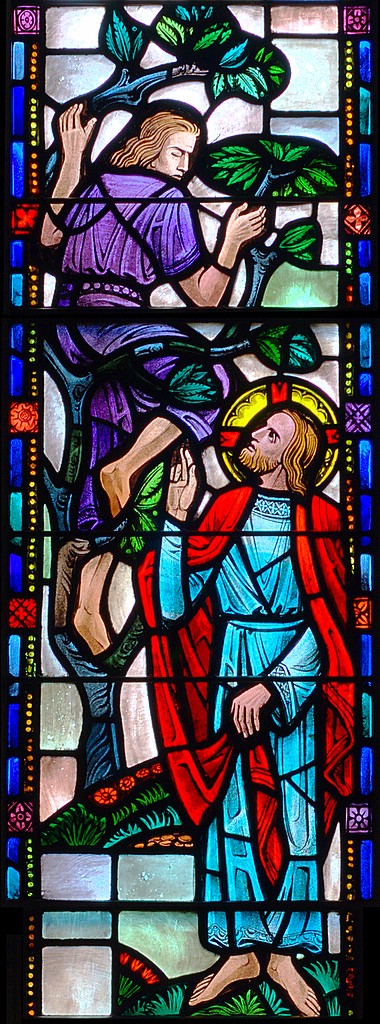 |
| Zacchaeus responded to Christ’s kindness to him by promising to return what he had stolen and give generously to the poor. See Luke 19 |
Another aspect of Dr. Zhivago that shows the evils of socialism is that Yuri leaves his wife to live with his lover. While this is by no means something that only happens in socialist societies, it does show a temptation of what can happen when all things are held in common and there is no personal property. People can view their personal relationships in the same way and want to take someone else’s wife (or husband, respectively) for themselves. This is by no means the norm even in socialist countries. A majority of people will still regard the marriage covenant as sacred, but there will be a strong temptation to view other people’s spouses as common property, since everything else is held in common. This can happen especially among the ruling class, who view the people as slaves anyway. They can abuse their authority to tempt someone else’s wife to be unfaithful with the promise of a more comfortable life, or coerce with the threat of mistreatment of the woman’s husband if she doesn’t comply. Such is the terrible wickedness of the sinful heart.
Because socialist societies are, by necessity, run by totalitarian dictators or central committees, the workers are not free to make decisions about how their companies are run, even if it was their company to begin with. The government plans the economy, but a central government cannot foresee or react to customer needs or market trends or changes in a timely manner, which results either in overproduction of unwanted products, or in scarcity. I have several Russian made camera lenses from the Soviet era which I purchased cheaply in the early 2000’s because during the Soviet years they overproduced these products because the factories had government quotas to meet, but since they did not update the pre-WWII German Zeiss designs after they captured the East German factories after the war, there was not as much demand for the lenses as there was supply. These items can still be bought inexpensively because there were so many produced.
Overproduced, underdeveloped camera lenses are a trivial problem, but what wasn’t trivial was the Russian famine which happened in 1921-1922. Because the Bolsheviks took control of the farms and the food produced by the farms, there was widespread famine and millions of people are reported to have died from starvation. Farming is hard work under the best of circumstances, and farmers who can make a profit from their labor work hard to get the highest yield while carefully farming in a sustainable way so that they can make good profits year after year. In a planned socialist economy the farmers have neither the incentive to work hard, nor to take care of the land, and because the output of the farms is controlled centrally, in times of scarcity the elites get fed first, while the worker/slaves are left to starve. The freedom of American farmers to manage their farms and sell their produce as they see fit is why the United States has been long known as the “breadbasket of the world” and continues to be so. The current U.S. regulations which promote industrialized farms, however, may be good for low prices, but I believe it may not be good in the long run for farmers, nor the small rural towns which support agriculture, nor for the country as a whole, but that is a topic for another time.
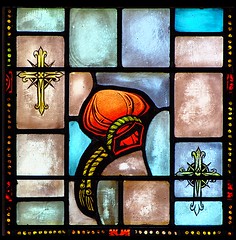 |
| Money bag for giving to the poor. When God gives us more than we need we are to give generously to those in need. |
Because socialists are naturally atheists, and not Christian, they do not trust people to be charitable and generous to those in need, so they say that the government must care for the poor instead of their own family and neighbors. In a predominantly free Christian society, where people are able to earn more than they need, they are generous with their charity and the poor are well cared for until they can get back on their feet and provide for themselves. Sometimes people will say that poverty causes crime. That is false. During the great depression in the United States in the 1930’s after the stock market crash of 1929, unemployment was about 25% of those of working age for quite some time, and people cared for one another. Crime did not rise as much as poverty because most Americans were Christians and they lived honest lives, and the poor were content to live off the charity of others until they got back on their feet financially. The post-war economic boom was a result of people who had lived through the depression and the war and wanted to work hard to make a better life for themselves and their families, and they were willing to work hard to do so as long as they were properly rewarded for it.
Christianity does not necessarily require a certain political or social structure. Christians can, and do, live in all societies, even where it is illegal for them to practice their religion openly. Christian principles do tend to favor good and just practices and rule out certain unjust practices where we have a say in how things are run. The Christian worldview is more honest about human nature than the worldview which leads to socialism. Christianity teaches that all people are naturally sinners whose selfishness needs to be curbed by laws and penalties for expressing that selfishness, through stealing, greed, and other sinful deeds. Not only is Christianity more honest about the sinful, selfish nature of man, it is also more compassionate, forgiving, and encouraging, even to unbelievers. Christianity teaches that all people are sinners and selfish, and that is why the United States Constitution sets checks and balances on each of the three branches of government to curb the power grabbing tendencies of each. We have been historically weak curbing the judicial tyranny, and that is where our government is weakest currently, but we pray that will be set right soon. Many Christians (and others) are working to accomplish true justice and lawfulness in our judicial system, but we are not nearly there, yet.
It is no coincidence that Christians were very prominent in the abolitionist movements in Europe and America. It wasn’t only Christians who were against slavery, but Christianity played a prominent role in abolishing slavery in the 19th century in many places.
 |
| Jacob favored Joseph, but Joseph’s brothers envied him and sold him into slavery. Joseph forgave them and saved them from famine. |
Also the New Testament is likewise ambivalent about slavery, recognizing that it exists in a sinful world, but setting limits on the evil. St. Paul writes, “Slaves, obey your earthly masters with respect and fear, and with sincerity of heart, just as you would obey Christ.” (Ephesians 6:5) But he also sets limits on the masters when he writes, “Masters, provide your slaves with what is right and fair, because you know that you also have a Master in heaven.” (Colossians 4:1) Here both slave and master are called on to be good Christians. St. Paul also writes, “Were you a slave when you were called? Don’t let it trouble you – although if you can gain your freedom, do so. For he who was a slave when he was called by the Lord is the Lord’s freedman; similarly, he who was a free man when he was called is Christ’s slave. You were bought at a price; do not become slaves of men.” (1 Corinthians 7:21-23)
The operating principle in both the Old Testament and the New Testament is that we are all servants of God and we ought to serve one another in love all the time, but as Christ has humbled Himself for our sake even unto death (see Philippians 2) for our benefit, we are free men in God’s sight, even if we live as slaves here on earth. It was this sort of teaching which in 19th Century United States made the Christian American slaves much more noble than their wicked masters. This is why the character, Uncle Tom, in Harriet Beecher Stowe’s book, Uncle Tom’s Cabin, resonated so much with white northern Christian abolitionists that they supported the Civil War and tens of thousands of free Northerners fought and died to make all Americans free men.
St. Peter writes, “Slaves, submit yourselves to your masters with all respect, not only to those who are good and considerate, but also to those who are harsh. For it is commendable if a man bears up under the pain of unjust suffering because he is conscious of God. But how is it to your credit if you receive a beating for doing wrong and endure it? But if you suffer for doing good and you endure it, this is commendable before God. To this you were called, because Christ suffered for you, leaving you an example, that you should follow in his steps.” (1 Peter 2:18-21) Sinful man may be cruel, but Christians are to be kind and forgiving even to the most wicked person. Jesus is our example in this. The first words He spoke after being nailed to the cross and lifted up to be crucified is, “Father, forgive them, for they know not what they do.” (Luke 23:34)
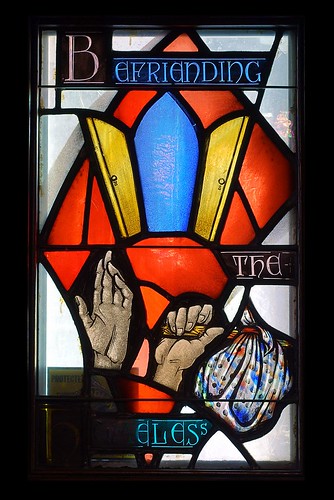 |
| Christians ought to befriend the homeless to help people to support themselves again, not to make homelessness a permanent condition. |
Ultimately, the problem with socialism is that people don’t trust that God will provide us with daily bread, and we are too greedy to share what we have above our needs, so we look for worldly solutions. Such worldly solutions are bound to fail because of all people’s sinful nature. People are selfish and will tend toward solutions which benefit them, personally, but will harm their neighbor. Socialism is just such a worldly solution.
Jesus also has other teachings against the ideals of socialism. He said, “Do unto others what you would have them do unto you.” (Matthew 7:12) This would prevent us from taking our neighbor’s hard earned possessions for ourselves, or sanctioning the government to do the same. If God has blessed me with great talent and skill, and has rewarded me commensurately for my use of these gifts, then I ought to be able to determine how I use my wealth to also help my neighbor. Christian Americans are generally wealthy people (from a worldwide perspective), but they are also generous to those in need. Governments, and people exercising power within governments, are not always wise in how they use public funds in giving aid to people in need. They often give money to people who don’t need it, or who misuse it, and they often take some of the money to enrich themselves before anyone in need sees a (much smaller) benefit. Government corruption is yet another reason why enforced socialism is a wicked system.
There is no perfect form of government because all people are sinful and some will attempt to work any system for their own benefit. However, socialism has many flaws which are inherently wicked and cannot be redeemed. The institutionalizing of thievery and slavery can never end well in any system of society. Socialism makes many good-sounding promises, but because it is inherently evil, it will never fulfill its promises nor even its best intentions.
“You are all sons of God through faith in Christ Jesus, for all of you who were baptized into Christ have clothed yourselves with Christ. There is neither Jew nor Greek, slave nor free, male nor female, for you are all one in Christ Jesus. If you belong to Christ, then you are Abraham’s seed, and heirs according to the promise.” (Galatians 3:26-29)
Other Bible Verses which Speak Against Socialism
“Whoever despises his neighbor is a sinner, but blessed is he who is generous to the poor.” (Proverbs 14:21)
“The desire of the righteous ends only in good, the expectation of the wicked in wrath. One gives freely, yet grows all the richer; another withholds what he should give, and only suffers want.” (Proverbs 11:23-24)
“For you say, ‘I am rich, I have prospered, and I need nothing,’ not realizing that you are wretched, pitiable, poor, blind, and naked.” (Revelation 3:17)
Jesus said, “Fear not, little flock, for it is your Father's good pleasure to give you the kingdom. Sell your possessions, and give to the needy. Provide yourselves with moneybags that do not grow old, with a treasure in the heavens that does not fail, where no thief approaches and no moth destroys. For where your treasure is, there will your heart be also.” (Luke 12:32-34)
“We are treated as impostors, and yet are true; as unknown, and yet well known; as dying, and behold, we live; as punished, and yet not killed; as sorrowful, yet always rejoicing; as poor, yet making many rich; as having nothing, yet possessing everything.” (2 Corinthians 6:8-10)
“Whoever mocks the poor insults his Maker; he who is glad at calamity will not go unpunished.” (Proverbs 17:5)
“Whoever oppresses the poor to increase his own wealth, or gives to the rich, will only come to poverty.” (Proverbs 22:16)
“Do not rob the poor, because he is poor, or crush the afflicted at the gate, for the Lord will plead their cause and rob of life those who rob them.” (Proverbs 22:22-23)
“Am I still to forget, O wicked house, your ill-gotten treasures and the short ephah (a weight measure), which is accursed? Shall I acquit a man with dishonest scales, with a bag of false weights? Her rich men are violent; her people are liars and their tongues speak deceitfully. Therefore, I have begun to destroy you, to ruin you because of your sins. You will eat but not be satisfied; your stomach will still be empty. You will store up but save nothing, because what you save I will give to the sword. You will plant but not harvest; you will press olives but not use the oil on yourselves, you will crush grapes but not drink the wine.” (Micah 6:10-15)
See also my article on “The Problem with Democracy”
See also my article on “The Problem with Sexual Politics”

